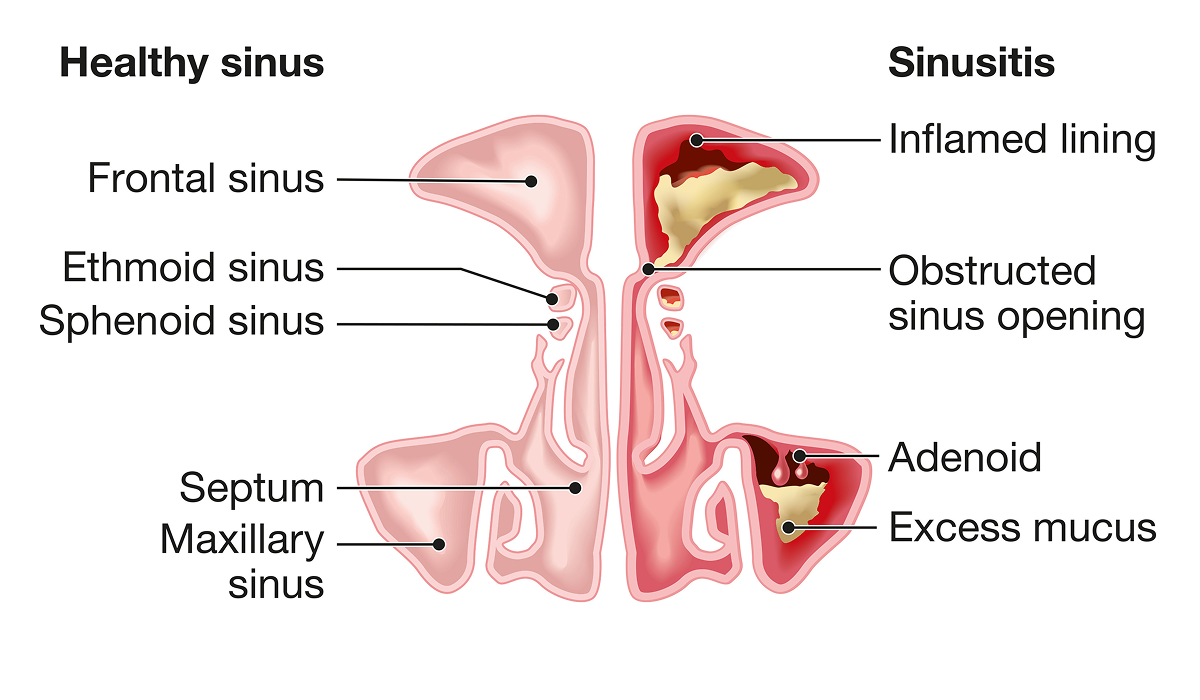Sinus infection (sinusitis): Symptoms, causes & treatment
Find a doctorIf you're dealing with facial pain, congestion and sinus pressure that just won’t go away, you may have a sinus infection, also called sinusitis or rhinosinusitis. These infections are common and treatable. Our team of ear, nose and throat specialists are here to help you breathe easier.
Need care now? Try telehealth
Symptom Checker can help you find the right type of care based on your symptoms. From 24/7 urgent care video visits to e-visits, we’ll recommend the best visit for you. Try Symptom Checker in LiveWell.
What is a sinus infection?

This is a comparison of a healthy sinus with a sinus affected by sinusitis. Sinusitis causes inflammation, mucus buildup and blocked sinus openings.
A sinus infection happens when your nasal cavities become swollen and inflamed due to an infection from bacteria, fungus or a virus. This condition affects millions of people each year and can feel a lot like a cold, but it tends to linger longer and cause more discomfort.
Types of sinus infections
There are two main types of a sinus infection:
- Acute sinusitis: Short-term inflammation that can last up to four weeks, often caused by a viral infection.
- Chronic sinusitis: Symptoms that last 12 weeks or longer, sometimes due to allergies, nasal polyps or a deviated septum – the cartilage and bone wall that separates the nasal passages.
Sinus infection symptoms
Sinus infection symptoms can range from mild to severe. You might experience:
- Facial pain or pressure
- Stuffy or congested nose
- Thick yellow or green nasal discharge
- Headache, especially around your eyes or forehead
- Postnasal drip (mucus dripping down your throat)
- Tooth pain
- Bad breath
- Fever
- Fatigue
If these symptoms last longer than 10 days or worsen after initially improving, it could be a sign of a bacterial sinus infection and a visit with your doctor may be needed.
Sinus infection causes
Several factors can lead to sinusitis. These include:
- Viral infections: The most common cause of acute sinus infections
- Bacterial infections: Can develop when a viral infection lingers
- Fungal infections: Less common but may occur in people with weakened immune systems
- Allergies: Ongoing inflammation can block sinuses
- Nasal polyps: Noncancerous growths that can obstruct nasal passages
- Deviated septum: A crooked nasal wall that affects sinus drainage
- Environmental irritants: Smoke, pollutants or dry air
Is a sinus infection contagious?
Viral sinus infections can be contagious much like a cold, especially in the early stages. However, if your sinus infection is caused by bacteria or an underlying condition such as allergies, it's usually not contagious.
Diagnosing & treating upper respiratory infections
Meet with your doctor or seek urgent care with an e-visit or urgent care video visit. They’ll ask about your symptoms and rule out other causes, such as colds, allergies or more serious infections.
Your doctor may also do a nasal endoscopy or imaging, such as a CT scan or X-ray, for a closer look at your sinuses. If you get frequent infections, your doctor may recommend allergy testing to check for seasonal allergies. They’ll also check for swelling, tenderness and nasal discharge.
Most sinus infections go away on their own, especially if they’re viral. Rest, hydration and nasal care can go a long way in getting rid of a sinus infection.
Home remedies for sinus relief include saline nasal sprays or rinses, using a humidifier and placing a warm compress on your face. Over-the-counter decongestants and pain relievers may also offer some relief.
If your sinus infection is bacterial, your provider may recommend an antibiotic for the sinus infection. Nasal corticosteroids and allergy medications may also be recommended if allergies are causing your sinus infection. For more severe inflammation, you may take oral steroids.
Get care
We help you live well. And we’re here for you in person and online.